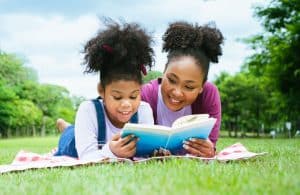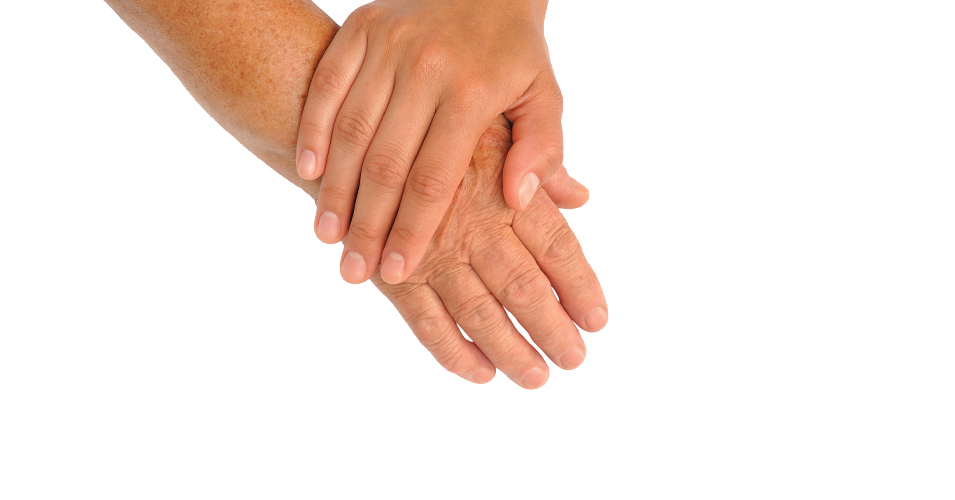When I was 3 years old, I learned my first lesson in caring for another person. I woke from an afternoon nap and found my mother sick in bed, eyes closed, face tight with pain. I touched her forehead. It was hot. So I did what she’d always done for me: I soaked a washcloth under the faucet, folded it into a square, and placed it on her head. Wringing it out, however, was a skill I’d not yet grasped, so the dripping washcloth left a trail all the way to her bed. When I raised it to her forehead, the water poured over her face.
My mother loved telling this story. Each time she did, her eyes grew moist. In telling about it, my mother’s message was: Don’t be afraid to show compassion, even if you make a mess of it.
As a child, I never again found my mother taking an afternoon in bed.
My own children got an early start caring for another person. Jaye was 3 years old and Em was 9 months old when I was diagnosed with ovarian cancer. I went from caregiver to care receiver overnight. Nineteen-pound Em had to go live with my mother, because my hysterectomy—specifically, my 8-inch surgical incision—prevented me from lifting anything heavier than 10 pounds. Jaye at least was old enough to stay at home between chemotherapy treatments. She went from playing w ith toys and caring for dolls to bringing me glasses of water, extra blankets, and feel-better drawings.
Whenever I had chemo, Jaye went to my mother’s house for a four-day stay. One week, however, I felt good after treatment and thought the worst was behind me. “Let’s bring Jaye home,” I told my husband, so we went and got her. He parked the car in the driveway; she escorted me into the house, guided me up to bed and tucked me in. I leaned in for a kiss, but instead heaved up lunch at her feet.
With all the gravitas of a preschooler trying to act like an adult, she walked to the nearest window, opened it, and yelled, “Daddy, come quick! Mommy threw up!”
Like my mother, I told people this story because I was proud of Jaye’s compassion. But often I heard “poor thing” in response. Who, me? My kids? Not at all. I believed myself and my girls lucky, because they were too little to know anything about the disease beyond what I told them. In fact, we handled it as if it were no big deal.
Ten years later, cancer revisited our family. In June 2004 my mother was diagnosed with terminal liver cancer. I was an only child. My father was in a nursing home. There was no question: When the time came, I would care for my mother, with the help of hospice. Jaye was 13 and Em was 10—old enough to understand what lay ahead for their grandmother and old enough to be frightened.
Em was the first to say it aloud. She’d had a long-standing tradition of Friday-night sleepovers at grandmother Aka’s house, but now she was reluctant to go. When I asked why, she blurted out, “Because I’m scared I’m going to wake up and find Aka dead!”
“No, you won’t,” I reassured her. “Aka has many good months ahead of her. It’s not like she’ll be healthy one day and gone the next. She’ll begin to slow down and not be able to do the things she normally does. When that happens, she’ll move in with us.”
Initially given five to seven months to live, my mother defied all the odds and lived normally—so normally we almost forgot she was terminally ill. But on Dec. 10, 2005, a year and a half after her diagnosis, the phone call came. “I’d like to come over to your house,” she said.
“What time? I’ll pick you up,” I replied.
“No, not for a visit. I want to come and stay. Tomorrow if that’s OK.”
After she moved in, the slow decline I’d hoped for became a fast slide. Within 24 hours, the change was obvious—as if she’d finally relaxed her grip on life.
The first morning at my house, she was too tired to leave her bed. It was her birthday, but she had little interest in her favorite meal or a birthday cake. She stopped eating solid foods and slept most of the day. One afternoon I found her with eyes closed, face pale and tight. No washcloth could ease this pain. Instead, I crawled under the covers, curled up next to her and fell asleep. When I awoke, her arm was draped protectively over me.
The next day she requested that hospice deliver a hospital bed to the living room so she could be near us. They set it up that afternoon, next to the Christmas tree.
On Dec. 23 our family minister stopped in for a visit. I left him alone with my mother but hovered in the next room. She wanted to fly away, she told him, but there wasn’t enough room for us to fit under her wings. She sounded agitated but then quieted down. He came out a few minutes later and said she was resting peacefully. Those were the last words she spoke. On Christmas Eve, she slipped into a coma.
We took turns sitting with her, holding her hand, talking or just listening to her breathing. Over time, it grew slower and raspier. I kept thinking, Any minute now. Minutes lengthened into hours. Hours stretched into days.
On the morning of Dec. 28, Jaye had left to babysit at a neighbor’s and Em was sleeping upstairs when my mother’s breathing changed. Just after 8:30 she took a barely audible breath. I waited for an exhalation that never came.
After five minutes, I phoned the hospice nurse, Beverly, to let her know my mother had died. I waited until the nurse arrived before I woke Em with the news, then went down the street to tell Jaye. The moment she saw me at the door, she knew. I wrapped my arms around her and whispered, “Go home. I’ll stay with the kids.”
Beverly suggested she be present when my daughters said goodbye. Warm and steady, Beverly answered questions and explained the transition. Together, they sat with Aka for 15 minutes. Weeks later, Jaye told me how that moment brought home the finality of death. “When you touch someone who’s alive, you don’t even notice they’re warm. But when I kissed Aka’s cheek, she was cold. That’s how I knew.”
Afterward, Em went back up to her room and Jaye returned to her babysitting job. Having experienced death in a way few children do—and still sorting through mixed feelings of grief, loss, awe and respect for life—they somehow went on with their lives that morning.
I came home and, with Beverly’s help, did one last thing for my mother. I picked up a hairbrush, ran it through her thick hair, unbuttoned her nightshirt, and slid her arms out of the sleeves in order to wash her. Then, from a bowl I’d filled with warm water, I removed a wet washcloth. I watched the water run down in thin rivulets. I closed my eyes, remembering the first time I’d taken care of another person, and then, with two hands, I wrung the washcloth out.





